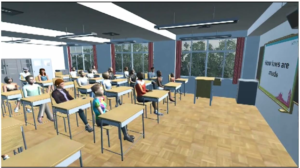Taking legal outreach online: how law students can help bridge the justice gap during lockdown

by Hugh McFaul
Pro bono legal work is part of the DNA of the UK legal profession and can involve lawyers working without pay to help provide access to justice for those unable to pay for legal advice and representation. Following the same tradition, universities throughout the UK and beyond, commonly provide opportunities for their law students to provide much needed legal advice, education and guidance to members of the public.
This can be through provision of pro bono advice clinics, legal education workshops in local schools, prisons and community settings and by supporting litigants without professional representation during court proceedings. Many traditional face-to-face universities are now having to rethink whether they can continue to offer this type of community based legal support in the socially-distanced circumstances in which we all find ourselves. Can these types of projects be run online?
Justice in Action
The Open Justice Centre has been trying to answer this question since it launched Justice in Action in 2017. Justice in Action is a credit bearing module and part of the UK’s largest undergraduate law degree programme, educating over 7,000 students. It aims to make innovative use of education technologies to provide a bridge between law students and the community by enabling them to utilise their hard-won legal knowledge and skills to further the OU’s social justice mission by providing free legal advice, education and guidance to the public.
Phase I
The module is delivered online in two phases, to our predominantly part time distance learners. Phase I begins by introducing the overarching themes of social justice, professional identity and professional ethics before developing transferable skills of legal research, writing, oral advocacy and online collaboration. Innovative applications of technology, including bespoke smartphone based virtual reality, are embedded into both the teaching and practical phases of the module. There is a specific focus on how technology is transforming the delivery of legal services and developing the skills and competencies required for professional practice.

Figure 1: Image from Open Justice VR App where students can practice their legal presentation skills
Phase II
Phase II involves students collaborating online to in pro bono projects that use technology to deliver legal services and public legal education. Three examples are:
Legal Policy Clinic
Students collaborate with a number of NGOs and charities to provide legal and policy consultancy under the supervision of legal academics. This has included working with:
- Young Citizens – a national legal education charity to develop a series of materials to support legal literacy in UK schools
- Inverclyde Advice & Employment Rights Centre on employment law issues to support non-unionised workers
- JustRight Scotland – a human rights charity to produce policy research on the Scottish Government’s response to Female Genital Mutilation
Virtual Law Clinic
Our online advice clinic provides a professional standard level of legal advice on civil law issues to members of the public. Students are supervised by qualified lawyers and collaborate through a secure web-based platform where documents and communication are encrypted and protected. Students, supervisors and clients are geographically dispersed and work together on cases ‘virtually’ using online collaboration tools to produce a letter of legal advice for the client.
The experience I have had undertaking the Open Justice activities, and in particular the Legal Advice Clinic, has been some of the most rewarding of any other during my law degree and I am hoping that I can continue to be involved after I graduate. Working on live cases has given me the opportunity not only to make a practical difference to people’s lives, but also to test my legal knowledge and skills.
Justice in Action student
Freedom Law Clinic
We were the first UK University to offer online participation in the Freedom Law Clinic (FLC). FLC is a not-for-profit company providing pro bono research and advice on appeals for people who have been convicted of serious criminal offences but who are maintaining their innocence.
The whole process of working with FLC felt like a professional collaboration rather than an academic exercise so this was a great motivator and certainly helped me to feel like I was contributing to a case and a client, rather than being treated as a student helper.
Justice in Action student

Figure 2: Open Justice Team being presented with the pro-bono award for technology in 2019 by Robert Buckland, UK Lord Chancellor
What have we learnt?
The good news is that our adventures in the unchartered waters of online pro bono have shown that meaningful pro bono legal opportunities can take place in online environments and that these projects can have genuine public benefit. The hard part is that there are considerable challenges to be overcome in making these projects work. Two key points stand out.
Firstly, developing effective communication and collaboration skills for remote working takes time, thought and energy. This this has been the foundation for all our successful projects. Secondly, the teaching needs to lead the technology, don’t be tempted to put the technology in the driving seat. It is tempting to try to experiment with technology for its own sake and it’s easy to become a little intoxicated by its potential, but thought and care needs to go into the design of your projects to ensure that technology facilitates engagement and learning rather than becoming a barrier to it.
We are aware that taking face to face pro bono projects online can seem daunting, so we have invited colleagues from UK universities thinking of making this journey to attend a free webinar on 15 May to discuss their plans and our experiences.

Hugh McFaul
Hugh McFaul is Co-Director of the Open Justice Centre and Module Chair of Justice in Action.
Justice in Action is a finalist in the 2020 Thomson Reuters Teaching Law with Technology Prize.
References
- McFaul, H. and Ryan, F. 2019. Technological innovation in legal education. In Cownie, F. and Jones, E. eds. Key Directions in Legal Education: National and international perspectives. Routledge.
- McFaul, H. 2020. Does Clinical Legal Education Need Theory? Asian Journal of Legal Education (Early access).
- McFaul, H. and Fitzgerald, E. 2019. A realist evaluation of a virtual reality smartphone application. British Journal of Education Technology.
- Ryan, F. 2019. A virtual law clinic: a realist evaluation of what works for whom, why, how and in what circumstances? The Law Teacher
- Jones, E.; Ryan, F. and McFaul, H. 2018 Connectivity, confidentiality and confidence: Key issues in the provision of online pro bono activities International Journal of Clinical Legal Education, 25(2) (pp. 48-88)
- Jones, E.; Ryan, F. and McFaul, H. 2017 Clinical legal education in the United Kingdom: Origins, growth and the technological innovations and challenges of its future (2017) German Journal of Legal Education, 4 (pp. 107-136)
This blog represents the views of the individual, not SCiLAB or the Open University

